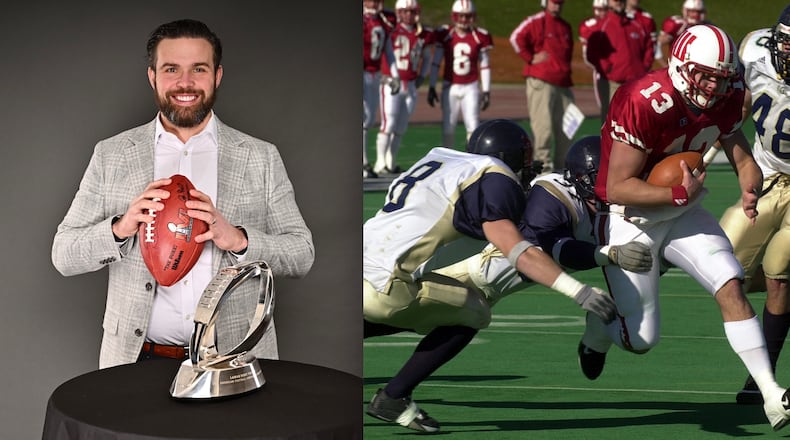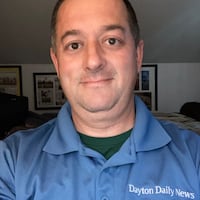“It’s been insane,” Holmes said. “It’s been spectacular. That’s the best way to put it. We’re working extremely long hours, but it doesn’t feel like it because of all the excitement and everything we’re working on is phenomenal.”
Holmes, an Oxford native who worked as a ballboy as a kid for the Miami RedHawks and graduated from Talawanda High School in 2001, was a three-year starter at Wittenberg. He ranked second in school history in passing yards (4,560) when his career ended and now ranks seventh.
Holmes redshirted as a freshman at Wittenberg in 2001 and earned the starting job in 2003. After returning for a fifth season in 2005, he broke the collarbone in his non-throwing left shoulder in the season opener against Capital. He returned after missing four games but reinjured the shoulder late in the season.
Despite the disappointing ending, Holmes learned lessons playing at Wittenberg for coach Joe Fincham that continue to help him today.
“Accountability, persistence, work ethic, time management, those are all things that you learn as a college athlete,” Holmes said. “Coach Fincham, one of his favorite words is toughness. I know it sounds crazy in the business world to talk about toughness, but you need mental toughness in a sales role because even if you’re an NFL franchise, anybody in sales will tell generally you get a lot more nos than you do yesses. That takes overall mental toughness and persistence that I think college athletics can really help drill into you quick.”
Holmes and his team sell suites in Paul Brown Stadium, the advertising in the stadium, whether that’s signage or commercials on the scoreboard, as well as ads on radio, television, digital and social channels.
Holmes started developing the skills that help him in his job while working toward a degree in business management at Wittenberg. After graduating in 2006, he got into coaching and returned to Wittenberg as the quarterbacks coach in 2007.
Holmes eventually decided he didn’t want to stay in coaching but wanted to remain sports in some way, so he enrolled in Ohio University’s sports administration program. While there, he interned with the Bengals one summer. That led to a full-time job with the franchise in 2011 as a senior manager in corporate sales. He was promoted to his current position in 2016.
Over the years, Holmes has had a front-row seat for the highs and lows of the Bengals and a great view of this Super Bowl run.
“If you rewind, the excitement started almost two years ago now with the drafting of Joe Burrow,” Holmes said. “When you factor in one of the most likable, marketable faces in all of sports and you bring him to Cincinnati, it’s a franchise changer. Then with some of the offseason moves we made and some of the success we saw early on in the season, their momentum started to grow. Then they just kind of caught fire and have gained enormous national attention. The excitement of going to Super Bowl takes that to another level. It’s so good for our fans, our ownership, our city. It’s going to have a positive impact on anyone associated with this organization at any level, which is amazing. It’s awesome.”
Burrow led the Bengals a 27-24 victory in the AFC Championship after falling behind 21-3. That comeback paled in comparison to what Holmes and Wittenberg pulled off in 2004. Wittenberg trailed Wooster 48-17 midway through the third quarter but tied the game at 58-58 on a 3-yard run by Holmes with 15 seconds to play only to lose the game 64-58 in overtime. Holmes threw for 439 yards and three touchdowns in that game.
One former Wittenberg assistant coach considers Holmes one of the best quarterbacks Wittenberg has had in recent decades, right next to Reed Florence. The players respected Holmes, as evidenced by the fact that one of his former offensive linemen, Corey Chatman, wrote, “That’s my QB!” after seeing photos of Holmes on Twitter this week. Burrow has a similar impact on the players around him.
“Anytime you get a guy that that holds himself to a standard that can’t be matched by anyone else, the locker room follows,” Holmes said, “and what’s cool to see from my perspective is the support and respect he garners from his teammates and the way they talk about him. He’s in year two, and he’s kind of been the catalyst for this franchise. It’s really exciting when you think about the future of what he’s going to do for the franchise in the long term. Then you combine that with a really young core of football players around him. I think there’s a lot of excitement about the future of the franchise. That starts with No. 9, but then it trickles down the rest of the way.”
Holmes has seen what playoff success has meant to the Brown family and owner Mike Brown, in particular.
“He’s working every day,” Holmes said. “He’s in the building, and he’s vested and you don’t see that with NFL ownership anymore. There just aren’t a lot of owners that are involved at a day-to-day level. That’s what’s so cool about my job. I get the opportunity to work with a lot of great companies throughout the region and nationally, but I also get the opportunity to work directly with an NFL ownership that is very vested in this organization and its people and the city.”
About the Author

